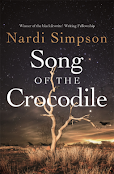As for all groups, 2021 was another challenging year for Minervans, but on the back of 2020 we knew what to do, so it was Zoom for our August and September meetings, and then in October, when rules relaxed but n to enough to have a house-full of people, we tried a late afternoon picnic. The Spring weather gods were kind and we had an excellent and enjoyable meeting.
But now, onto the real business of this post ... For the fifth year now, we Minervans voted for our Top Picks of the year. As before, each member was asked to nominate her three top picks from the books we read as a group this year ... and here is the outcome ...
All twelve currently active members took part, and all nominated the maximum three books, resulting in 36 "votes". Just to reiterate what we've said before: this is not a "proper" survey. Votes were all given equal weight, as was advised in the email request, even if some members ranked their choices. Also, not everyone read every book, meaning different people voted from different "pools". So, the results are indicative rather than authoritative, but it's fun and it does convey some sense of what we all liked.Last year we had a runaway winner with Melissa Lucashenko's Too much lip garnering 10 of the 36 votes, and the tied runners-up receiving 5 votes each. This year was completely different, with the vote being very close. The was just one vote between each book and the pacesetter behind it. It was a year in which it was very hard to make a choice.
- Shuggie Bain, by Douglas Stuart (our review) (8 votes)
- Song of the crocodile, by Nardi Simpson (our review) (7 votes)
- Girl, woman, other, by Bernadine Evaristo (our review) (6 votes)
Another difference from last year is that no nonfiction books appeared in out top picks. Indeed, although they generated excellent discussions eight of them earned a vote at all. The remaining books all received at least one vote.
Some comments on our top picks
- "I loved Shuggie Bain, for its perceptive story of a young boy struggling with poverty and a disfunctional family, and Agnes trapped by her dreams and addiction." (Kate)
- "really powerful story (ie very well written) that will stay with me for a long time." (Sylvia)
- "Wouldn't have read it without the Minervans keeping me company, but brilliant evocative writing." (Helen)
SONG OF THE CROCODILE:
- "punchy, truth-telling story about First Nations' lives in rural Australia." (Sue T)
- "fantastic women characters who faced horrendous challenges with guts -- I loved the 'fantastic aspects' of it too (eg the crocodile totem's presence)" (Sylvia)
- "Edgy and important" (Paula)
- "a saga of a story close to Country. Full of beauty and I think I understand intergenerational trauma more as a result of reading this book." (Helen)
- "I loved Girl Woman Other for its fabulous evocation of women in complicated relationships, exploration of gender and colour." (Kate)
- "satirical, insightful exploration of the lives of diverse women in contemporary England." (Sue T)
- "because it made me feel like I was almost there in London. A great book to read while the borders stopped travel." (Helen)
- "Evocative and compelling" (Paula)
- "Engaging, well plotted and historically plausible depiction of little known historical characters while famous character is kept in the background." (Sue B)
- "I loved entering this world of 16th century life in Stratford for the powerful story of an invisible woman, and the impact of grief." (Kate)
- "Powerful imagined history. Beautiful descriptive writing." (Paula)
Other recommendations
Again, several (including our coast-observer Marie) took up the option to share some other favourite books from their reading year. Here are their suggestions (alphabetically by author), for those looking for other reading ideas. Dare I say that, among last year's recommendations, was mine for Too much lip, so, you know, take these recommendations seriously!- Irma Gold, The breaking (Sue)
- Eddie Jaku, The happiest man on earth (Celeste)
- Helen Meany, Every day is Gertie Day (Sue)
- Rohinton Mistry, Family matters (such a beautiful writer) (Kate)
- Kate Moore, The woman they could not silence (Kate)
- Heather Morris, The tattooist of Auschwitz (Celeste)
- Jonica Newby, Beyond climate grief (very emotional memoir of her time on the south coast during the 2019/2020 bushfires) (Sylvia)
- Archie Roach, Tell me why (Kate)
- Trevor Shearston, Hare's fur (Sue)
And, then, there were picks from ex-Reading Group members in Sydney and the South Coast:
Marie
- Bernadine Evaristo, Girl, woman, other
- Sarah Winman, Still life
- Ingrid Persaud, Love after love
Susan (From the Moruya Heads sub-branch!)
- Brit Bennet, The vanishing half
- Douglas Stuart, Shuggie Bain
- Pip Williams, The dictionary of lost words
- Ariel Lawton, Code Name Helene ... for fast action and pure enjoyment
- Anne Tyler, The redhead by the side of the road ... for a lengthy and interesting discussion, and a reflection on self
- Sarah Winman, When God was a rabbit ... still going with this, however so far it is dealing with serious childhood issues with whimsy and humour, and is quite beguiling.
- Ayad Akhtar, Homeland elegies ... exploration of what it is to be a Muslim in New York in a mix of memoir, novel and essay. Plus fascinating father/son relationship)
- Colm Toibin, The magician ... dramatised portrait of Thomas Mann
- Christian Kiefer, The animals ... ‘Kiefer’s second novel contrasts wildness and civilization through the story of a man who runs an animal refuge to escape from his criminal past.’
- Sarah Winman, Still life ... I’ve read it twice already!
- Pip Williams, The dictionary of lost words
- Rutger Bregman, Humankind



